旧版新概念英语第三册与新版不同的课文整理
新概念第三册课文翻译及学习笔记
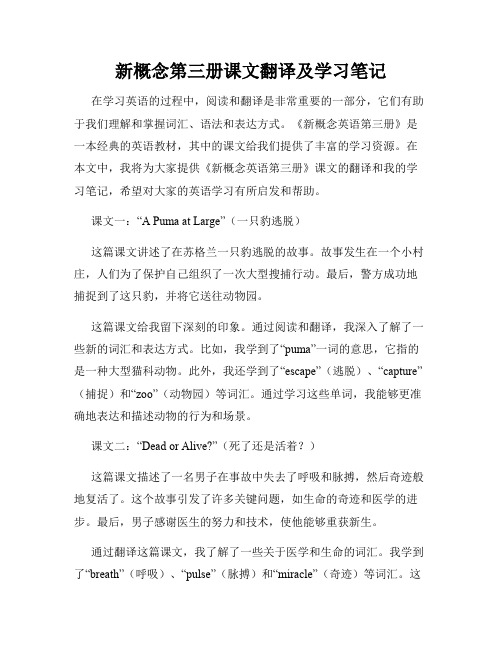
新概念第三册课文翻译及学习笔记在学习英语的过程中,阅读和翻译是非常重要的一部分,它们有助于我们理解和掌握词汇、语法和表达方式。
《新概念英语第三册》是一本经典的英语教材,其中的课文给我们提供了丰富的学习资源。
在本文中,我将为大家提供《新概念英语第三册》课文的翻译和我的学习笔记,希望对大家的英语学习有所启发和帮助。
课文一:“A Puma at Large”(一只豹逃脱)这篇课文讲述了在苏格兰一只豹逃脱的故事。
故事发生在一个小村庄,人们为了保护自己组织了一次大型搜捕行动。
最后,警方成功地捕捉到了这只豹,并将它送往动物园。
这篇课文给我留下深刻的印象。
通过阅读和翻译,我深入了解了一些新的词汇和表达方式。
比如,我学到了“puma”一词的意思,它指的是一种大型猫科动物。
此外,我还学到了“escape”(逃脱)、“capture”(捕捉)和“zoo”(动物园)等词汇。
通过学习这些单词,我能够更准确地表达和描述动物的行为和场景。
课文二:“Dead or Alive?”(死了还是活着?)这篇课文描述了一名男子在事故中失去了呼吸和脉搏,然后奇迹般地复活了。
这个故事引发了许多关键问题,如生命的奇迹和医学的进步。
最后,男子感谢医生的努力和技术,使他能够重获新生。
通过翻译这篇课文,我了解了一些关于医学和生命的词汇。
我学到了“breath”(呼吸)、“pulse”(脉搏)和“miracle”(奇迹)等词汇。
这些词汇帮助我更好地理解医学术语,并且能够与他人讨论与健康相关的话题。
此外,这篇课文也启发了我思考生命的宝贵和医学科技的重要性。
课文三:“Are you a good neighbour?”(你是个好邻居吗?)这篇课文围绕邻居之间的关系展开,强调了互助、友善和尊重的重要性。
它提醒我们要成为一个好邻居,关心他人,乐于助人,并遵守社区的规则。
通过阅读和翻译这篇课文,我学到了一些关于邻居和社区的词汇和短语。
比如,“neighbour”(邻居)、“community”(社区)和“rules”(规则)等。
(完整word版)新概念英语第三册重点学习内容介绍

新概念英语第三册重点学习内容介绍新概念第三册词汇首先呢,我们要做教材当中的内容呢,就是词汇的内容,词汇呢,我们注重的是两块。
一个叫词汇的数量,一个叫词汇的质量。
这个词汇的数量到三册尤为重要,因为二册的话,整个教材词汇加起来可能1000多个词汇.三册也不多,但三册我们需要把词汇量呢,拓展出来,所以我们需要用到构词法这个东西,词根、词缀这个东西.1。
词汇的数量比如说,我们在这个教材当中出现的比如说提到这个resident。
我们第五课提到的这个president,到后面这个第50课提到的assiduous,47课提到的这个insidious。
还有比如说我们会拓展出来的,比如说六级考研词汇当中的dissident,这些词看起来没有什么特别的联系,但是我们仔细分析发现,他们有一个相同的词根,这个词根叫Sid,那么这个词根是什么呢?是Sit,就是坐,坐在这个地方。
所以简单我们把它穿起来之后却发现,resident呢,是re开头的,这个re表示重复、反复.所以反复的到这个地方去坐下去、去休息,就是一个居住的、住所的地方,一个居民。
那president这个pre是之前,所以我一直坐在前排,我是个重要人物的,所以成为大学的校长啊,总统啊,这样的概念。
那么提到assiduous,那么这是表示勤奋的,为什么呢?A加辅音字母我们会经常提到,非常常见的一个前缀,它叫什么呢?叫做增强一个动作,表示这个动作意味的一个增强,没有特殊的含义,所以合到一起的话,就表示我们一直坐在这个地方。
所以我们中国人有句话讲叫能坐得住板凳的这样的人,属于非常辛勤、勤劳的人。
那么到assiduous这个的词,insidious这个in呐,是表示在里面,所以字面上看起来是什么呢?叫坐在其中.所以坐在其中是什么呢?叫暗中危害的。
再比如说dissident,dis相反的,所以坐在两个相反的方向,那就是有不同意见,有不同见解,所以叫有分歧的。
所以我们从词汇的角度,注重的第一层面的问题就是词汇的数量的问题。
新概念英语第三册课文及详解第3课(最新整理)

Lesson 3 An Unknown GoddessSome time ago,an interesting discovery was made by archaeologists on the Aegean island of Kea.An American team explored a temple which stands in an ancient city on the promontory of Ayia Irini.The city at one time must have been prosperous,for it enjoyed a high level of civilization.Houses--often three storeys high----were built of stone.They had large rooms with beautifully decorated walls.The city was even equipped with a drainage system,for a great many clay pipes were found beneath the narrow streets.The temple which the archaeologists explored was used as a place of worship from the fifteenth century B.C. until Roman times. In the most sacred room of the temple, clay fragments of fifteen statues were found. Each of these represented a goddess and had, at one time, been painted. The body of one statue was found among remains dating from the fifteenth century B.C. Its missing head happened to be among remains of the fifth century B.C.This head must have been found in Classical times and carefully preserved. It was very old and precious even then. When the archaeologists reconstructed the fragments, they were amazed to find that the goddess turned out to be a very modern-looking woman. She stood three feet high and her hands rested on her hip. She was wearing a full-length skirt which swept the ground. Despite her great age, she was very graceful indeed, but, so far,the archaeologists have been unable to discover her identity.Language points1, Some time ago,an interesting discovery was made by archaeologists on the Aegean island of Kea.*文中用了被动式,强调discovery,体现发现这个动作被考古学家做出英文表达中常用被动语态。
新概念第三册课文翻译及学习笔记

新概念第三册课文翻译及学习笔记第一课:A Puma at Large翻译:大自由行的美洲狮学习笔记:这篇文章讲述了一个关于美洲狮逃跑的故事。
故事中,一只美洲狮从克鲁格国家公园逃出,引起了人们的恐慌。
然而,野生动物专家迅速采取行动,成功地将它捕获并带回了公园。
这个故事告诉我们人类与野生动物之间的关系,以及保护野生动物的重要性。
第二课:Are you a good traveller?翻译:你是一个好旅行者吗?学习笔记:这篇文章是一篇讨论旅行者特质的文章。
它提示我们成为好旅行者的关键特征,包括尊重当地文化和环境,保持积极的态度,以及对他人友好和乐于助人。
通过这篇文章,我们可以学习到如何成为一个更好的旅行者,并更好地享受旅行的乐趣。
第三课:The Last Leaf翻译:最后一片叶子学习笔记:这篇文章讲述了一个关于友谊和生命的故事。
故事中,一个艺术家生病了,她相信一旦附近的一棵树失去了最后一片叶子,她就会死去。
然而,她的朋友精心绘制了一片假叶子并将其悄悄地贴在了树上,使她相信自己已经康复。
这个故事强调了友谊的力量以及积极的心态对生活的重要性。
第四课:Saved by a Dolphin翻译:海豚的救助学习笔记:这篇文章讲述了一个冒险者在海上遇险后被海豚所救的故事。
故事中,当冒险者摔入水中时,一只海豚出现并让他抓住它的背鳍,将他带回了岸边。
这个故事告诉我们海豚是聪明而善良的动物,并且可以帮助人类。
它还强调了保护海洋生态系统的重要性。
第五课:An Unknown Goddess翻译:一个未知的女神学习笔记:这篇文章讲述了一个在海滩上发现雕像的故事。
主人公发现了一个美丽的女神雕像,并将其带回了家。
然而,当他向博物馆展示时,他们告诉他这是一个罕见而珍贵的古代艺术品。
这个故事强调了珍贵文化遗产的保护和对艺术的欣赏。
第六课:An invitation翻译:一封邀请函学习笔记:这篇文章是一篇关于社交活动的邀请函。
它描述了一个朋友邀请作者参加一个晚宴的情况。
新概念英语第三册精读笔记 Lesson 3

Lesson3 An unknown goddess无名女神课文Some time ago,an interesting discovery was made by archaeologists on the Aegean is land of Kea.An American team explored a temple which stands in an ancient city on t he promontory of Ayia Irini.The city at one time must have been prosperous,for it en joyed a high level of civilization.Houses -- often three storeys high -- were built of st one.They had large rooms with beautifully decorated walls.The city was even equipped with a drainage system,for a great many clay pipes were found beneath the narrow streets.The temple which the archaeologists explored was used as a place of worship from the fifteenth century B.C.until Roman times.In the most sacred room of the temple,clay fragments of fifteen statues were found.Each of these represented a godd ess and had,at one time,been painted.The body of one statue was found among rema ins dating from the fifteenth century B.C.Its missing head happened to be among rem ains of the fifth century B.C.This head must have been found in classical times and ca refully preserved.It was very old and precious even then.When the archaeologists rec onstructed the fragments,they were amazed to find that the goddess turned out to be a very modern-looking woman.She stood three feet high and her hands rested on her hi ps.She was wearing a full-length skirt which swept the ground.Despite her great age, she was very graceful indeed,but,so far,the archaeologists have been unable to disc over her identity.译文不久之前,在爱琴海的基亚岛上,考古工作者有一项有趣的发现。
(完整word版)新概念英语第3册课文解析

新概念第三册语法精粹第一章英语从句Subordination英语从句主要有定语从句,状语从句和名词性从句(主语从句,宾语从句,表语从句,同位语从句)一.定语从句定语从句:由关系代词 who, whom, whose, that, which; 关系副词 when, where, why 引导.(下面十个句子请读 5遍并脱口译出!)1。
The death notices tell us about people who have died during the week。
2。
The man (whom) you spoke to just now is my friend。
3. The building whose lights are on is beautiful.4。
Please find a place which we can have a private talk in。
5. The knee is the joint where the thighbone meets the large bone of the lower leg.6。
He still remembers the day when he went to school.7. It is no need telling us the reason why you didn’t finish it in time.8。
He has three sons, two of whom died in the war。
9。
Mr. Smith, whose wife is a clerk, teaches us English.10. In the Sunday paper there are comics, which children enjoy.只能用that和who引导的定语从句A.all, nothing, anything, a few, one做先行词指物时B.先行词前有形容词最高级修饰时,后面常跟that而不是which。
新概念英语第三册课文

新概念英语第三册课文.txt你看得见我打在屏幕上的字,却看不到我掉在键盘上的泪!自己选择45°仰视别人,就休怪他人135°俯视着看你。
Lesson19 A very dear cat Kidnappers are rarely interested in Animals, but they recently took considerable interest in Mrs Eleanor Ramsay's cat. Mrs Eleanor Ramsay, a very wealthy old lady, has shared a flat with her cat, Rastus, for a great many years. Rastus leads an orderly life. He usually takes a short walk in the evenings and is always home by seven o'clock. One evening, however, he failed to arrive. Mrs Ramsay got very worried. She looked everywhere for him but could not find him.Three day after Rastus' disappearance, Mrs Ramsay received an anonymous letter. The writer stated that Rastus was in safe hands and would be returned immediately if Mrs Ramsay paid a ransom of &1000. Mrs Ramsay was instructed to place the money in a cardboard box and to leave it outside her door. At first, she decided to go to the police, but fearing that she would never see Rastus again --the letter had made that quite clear--she changed her mind. She drew &1000 from her bank and followed the kidnapper's instructions. The next morning, the box had disappeared but Mrs Ramsay was sure that the kidnapper would keep his word. Sure enough, Rastus arrived punctually at seven o'clock that evening. He looked very well, though he was rather thirsty, for he drank half a bottle of milk. The police were astounded when Mrs Ramsay told them what she haddone. She explained that Rastus was very dear to her. Considering the amount she paid, he was dear in more ways than one!绑架者很少对动物感兴趣。
新概念英语第三册课文重点精讲解析Lesson1~3(最新)
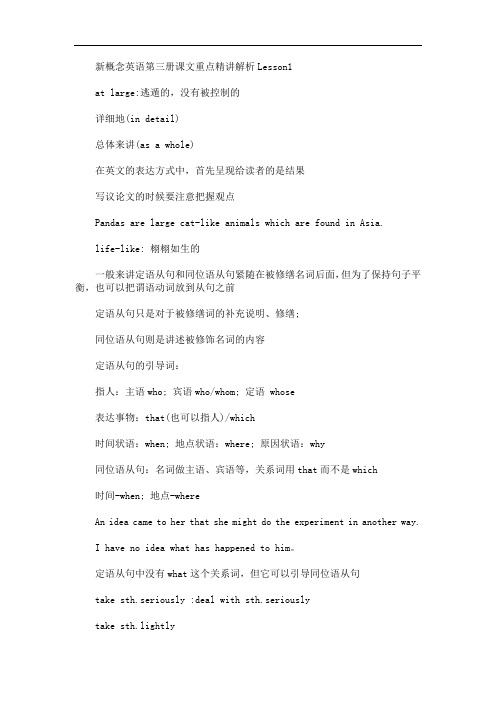
新概念英语第三册课文重点精讲解析Lesson1at large:逃遁的,没有被控制的详细地(in detail)总体来讲(as a whole)在英文的表达方式中,首先呈现给读者的是结果写议论文的时候要注意把握观点Pandas are large cat-like animals which are found in Asia.life-like: 栩栩如生的一般来讲定语从句和同位语从句紧随在被修缮名词后面,但为了保持句子平衡,也可以把谓语动词放到从句之前定语从句只是对于被修缮词的补充说明、修缮;同位语从句则是讲述被修饰名词的内容定语从句的引导词:指人:主语who; 宾语who/whom; 定语 whose表达事物:that(也可以指人)/which时间状语:when; 地点状语:where; 原因状语:why同位语从句:名词做主语、宾语等,关系词用that而不是which时间-when; 地点-whereAn idea came to her that she might do the experiment in another way.I have no idea what has happened to him。
定语从句中没有what这个关系词,但它可以引导同位语从句take sth.seriously :deal with sth.seriouslytake sth.lightlyas: 随着过去分词做定语声称曾经做过某事:claim to have done sth.I still remember the school where I studied English.confirm: be sure,be certainsearch=hunt把某物留在后面:leave behind英文的表达方式重点在于突出客观事实,而中文则善于运用动作的执行者complain of /about 抱怨on + 名词:强调动作正在进行on the rise :在上升on the increase: 在增加on the watch: 在观看on the match: 在比赛中on the fishing trip: 在钓鱼的途中on holiday: 在度假fully: completely,entirelyin the possession of sb.=in sb.'s possession 归某人所有in possession of sth. 拥有某物take possession of 拥有The beautiful car is in my possession/in the possession of me I am in possession of the beautiful carThe person in possession of the big house is excited.It is disturbing to think that...熟读并背诵第一自然段at largetake something seriouslycling toleave behindcomplain ofin the possession of/in possession offeel obliged to investigatea woman picking blackberriesa businessman on fishing tripgo on for several weeksin the quiet countryside新概念英语第三册课文重点精讲解析Lesson2现在进行时和always等频度副词的搭配——表示说话人带有的情感色彩Tome is always doing homework.Tom always does his homework.He is always making noises.one or another: 表示某种,这样或那样I have to get enough money to have my house repairedhave the church clock repaired——have something done找某人来做某事have the plane repaired have hair cut某人所遭受到的意外某种情况——主语必须是发出动作的人His wallet was stolen. He had his wallet stolen.used to:过去常常做,而现在不再发生的事情了He used to smoke every day.however——用于口语,主要用于句首,作文中,用在句中、句尾,要用逗号分隔开来He said that it was so,he was mistaken,howeverHe said that it was so,however,he was mistaken.I know his story,however,I wouldn't like to tell you.I know his story,I,however,wouldn't like to tell younevertheless nonethelessstart: 惊跳,惊奇before:...才Armed with a torch...现在分词和过去分词的用法 looking分词做状语/定语的时候,一定要注意它和逻辑主语要呼应一致in the torchlight非正式用语中whom可以省略掉recognized somebody as: 认出某人是regard somebody as,think of somebody as,treat somebody as,have on somebody aswhatever: ever用来加强语气night after night: 一夜连着一夜day after day year after yearweek after week bus after busdid 肯定句中常用do,did,does加强语气和情感色彩,一定要位于动词原形之前as well 用在句尾相当于to,主要用于肯定句中,但比to所表达的语意更优秀 stil用于句首,用逗号分隔开来——表达一个转折的关系:虽然如此,但是get used to,be used to,be accustomed to,get accustomed to 都表示习惯于 get强调渐近的过程, be强调习惯了的状态。
(完整版)新概念英语第三册课文及详解第2课
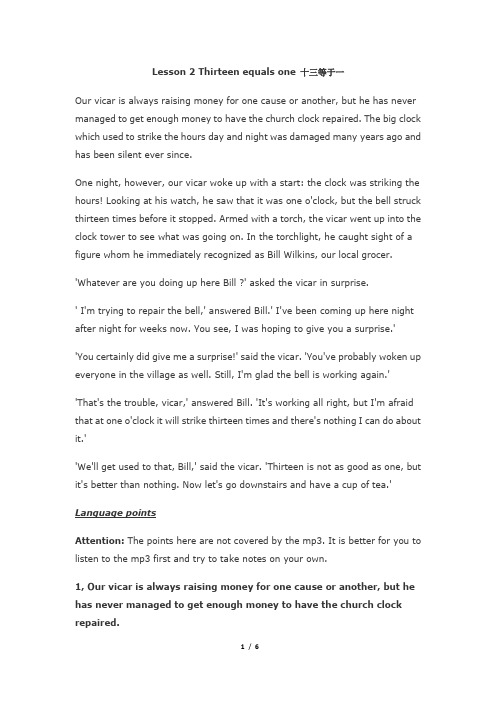
Lesson 2 Thirteen equals one 十三等于一Our vicar is always raising money for one cause or another, but he has never managed to get enough money to have the church clock repaired. The big clock which used to strike the hours day and night was damaged many years ago and has been silent ever since.One night, however, our vicar woke up with a start: the clock was striking the hours! Looking at his watch, he saw that it was one o'clock, but the bell struck thirteen times before it stopped. Armed with a torch, the vicar went up into the clock tower to see what was going on. In the torchlight, he caught sight of a figure whom he immediately recognized as Bill Wilkins, our local grocer.'Whatever are you doing up here Bill ?' asked the vicar in surprise.' I'm trying to repair the bell,' answered Bill.' I've been coming up here night after night for weeks now. You see, I was hoping to give you a surprise.''You certainly did give me a surprise!' said the vicar. 'You've probably woken up everyone in the village as well. Still, I'm glad the bell is working again.''That's the trouble, vicar,' answered Bill. 'It's working all right, but I'm afraid that at one o'clock it will strike thirteen times and there's nothing I can do about it.''We'll get used to that, Bill,' said the vicar. 'Thirteen is not as good as one, but it's better than nothing. Now let's go downstairs and have a cup of tea.'Language pointsAttention: The points here are not covered by the mp3. It is better for you to listen to the mp3 first and try to take notes on your own.1, Our vicar is always raising money for one cause or another, but he has never managed to get enough money to have the church clock repaired.现在进行时和always 等频度副词的搭配--表示说话人带有的情感色彩Tom is always doing homework.He is always making noises.one or another 表示某种、这样或那样get enough money 筹集足够的资金来做某事have sth. done 找某人来做某事e.g. have the plane repaired 修飞机have hair cut 剪头发tip: 在翻译中,不一定要把"找人"这两个字翻译出来,但是读者可以据常理推断这件事不是句中的主语做出的。
新概念第三册(全套)课文讲解和笔记
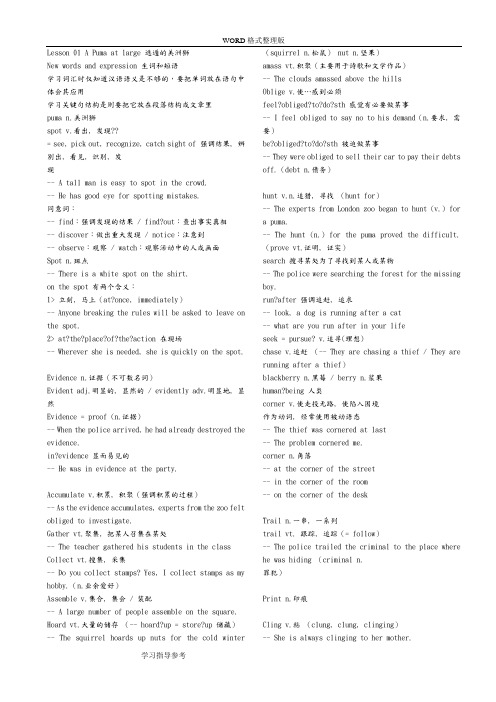
Lesson 01 A Puma at large 逃遁的美洲狮New words and expression 生词和短语学习词汇时仅知道汉语语义是不够的,要把单词放在语句中体会其应用学习关键句结构是则要把它放在段落结构或文章里puma n.美洲狮spot v.看出, 发现??= see, pick out, recognize, catch sight of 强调结果, 辨别出, 看见, 识别, 发现-- A tall man is easy to spot in the crowd.-- He has good eye for spotting mistakes.同意词:-- find:强调发现的结果 / find?out:查出事实真相-- discover:做出重大发现 / notice:注意到-- observe:观察 / watch:观察活动中的人或画面Spot n.斑点-- There is a white spot on the shirt.on the spot 有两个含义:1> 立刻, 马上(at?once, immediately)-- Anyone breaking the rules will be asked to leave on the spot.2> at?the?place?of?the?action 在现场-- Wherever she is needed, she is quickly on the spot.Evidence n.证据(不可数名词)Evident adj.明显的, 显然的 / evidently adv.明显地, 显然Evidence = proof (n.证据)-- When the police arrived, he had already destroyed the evidence.in?evidence 显而易见的-- He was in evidence at the party.Accumulate v.积累, 积聚(强调积累的过程)-- As the evidence accumulates, experts from the zoo felt obliged to investigate.Gather vt.聚集, 把某人召集在某处-- The teacher gathered his students in the class Collect vt.搜集, 采集-- Do you collect stamps? Yes, I collect stamps as my hobby.(n.业余爱好)Assemble v.集合, 集会 / 装配-- A large number of people assemble on the square. Hoard vt.大量的储存(-- hoard?up = store?up 储藏)-- The squirrel hoards up nuts for the cold winter (squirrel n.松鼠) nut n.坚果)amass vt.积聚(主要用于诗歌和文学作品)-- The clouds amassed above the hillsOblige v.使…感到必须feel?obliged?to?do?sth 感觉有必要做某事-- I feel obliged to say no to his demand(n.要求, 需要)be?obliged?to?do?sth 被迫做某事-- They were obliged to sell their car to pay their debts off.(debt n.债务)hunt v.n.追猎, 寻找(hunt for)-- The experts from London zoo began to hunt (v.) for a puma.-- The hunt (n.) for the puma proved the difficult. (prove vt.证明, 证实)search 搜寻某处为了寻找到某人或某物-- The police were searching the forest for the missing boy.run?after 强调追赶, 追求-- look, a dog is running after a cat-- what are you run after in your lifeseek = pursue? v.追寻(理想)chase v.追赶(-- They are chasing a thief / They are running after a thief)blackberry n.黑莓 / berry n.浆果human?being 人类corner v.使走投无路, 使陷入困境作为动词, 经常使用被动语态-- The thief was cornered at last-- The problem cornered me.corner n.角落-- at the corner of the street-- in the corner of the room-- on the corner of the deskTrail n.一串, 一系列trail vt. 跟踪, 追踪(= follow)-- The police trailed the criminal to the place where he was hiding (criminal n.罪犯)Print n.印痕Cling v.粘(clung, clung, clinging)-- She is always clinging to her mother.学习指导参考-- He clung to the hope that he would succeed. 他怀有成功的希望stick? v.粘住(-- stick the envelop)n.信封stick?to?坚持(-- stick to the plan / stick to one’s promise)n.许诺sticky? adj.粘的(-- sticky fingers)convince v.使…信服1>convince sb of sth-- I convince him of my honesty.(n.诚实, 正直)我使他相信我的诚实。
新概念英语新旧版本课文同异对照表

第26课 旧版 William S. Hart 【13】 新版 The Past Life of the Earth【18】
第27课 旧版 Knowledge and Progress【14】 新版 The ‘Vasa’ 【19】
第37课 旧版On Telling the Truth 新版The Process of Aging【28】
第38课 旧版The Sculptor Speaks【23】 新版Water and the Traveler
第39课 旧版Galileo Reborn【24】 新版What Early Writer Wants 【29】
第22课 旧版Porpoises 【10】 新版 Knowledge and Progress【14】
第23课 旧版 The Stuff of Dreams 【11】 新版 Bird Flight【15】
第24课 旧版 Going out for a Walk 新版 Beauty【16】
第5课 旧版 Gorilla 新版 Youth 【1】
第6课 旧版 Youth 【1】 新版 The Sporting Spirit 【2】
第7课 旧版 The Sporting Spirit 【2】 新版 Bats 【3】
第8课 旧版 Employment of Family 新版 Trading Standards
新概念英语新旧版本课文同异对照表 2008-3-12
第一册 课文绝大部分都是一样,除了个别的单词和名词有所改变以外。
第二册 课文除了有三课是不同外,其它都相同。相异课文如下所列:
新概念英语第3册课文

《新概念英语第3册课文》:探索英语进阶之路,提升你的语言技能一、课文内容概览新概念英语第3册课文以实用、生动的对话和文章为载体,带领学习者深入英语世界,全面提升听、说、读、写四项技能。
本册课文共有60课,每课都围绕一个特定主题展开,内容丰富多样,涵盖了日常生活、社会热点、科普知识等多个领域。
二、课文特点1. 词汇丰富:本册课文精选了2000多个高频词汇,为学习者提供了丰富的语言素材,助力词汇积累。
2. 句型多变:课文中的句子结构多样,涵盖了不同时态、语态、句型等,帮助学习者熟练掌握英语语法。
3. 对话真实:课文中的对话场景贴近生活,让学习者在模拟真实的语境中提高口语表达能力。
4. 文章深度:课文中的文章具有一定的深度和广度,有助于学习者提高阅读理解能力,拓宽知识视野。
三、学习建议1. 精听课文:反复听课文录音,提高听力水平,同时跟读模仿,锻炼发音和口语表达能力。
2. 理解课文:仔细阅读课文,理解文章大意,分析句子结构,掌握语法知识。
3. 词汇积累:整理课文中的生词和短语,制定复习计划,加强记忆。
4. 实践应用:将课文中的知识点运用到实际生活中,与他人进行英语交流,提高语言运用能力。
四、课文结构解析1. 对话部分:每课的开始都是一个生动的对话,这些对话不仅展示了语言的实际运用,还让学习者能够在轻松愉快的氛围中学习地道的口语表达。
2. 语法点讲解:紧随对话之后的是语法点的详细讲解,通过实例分析,让学习者更好地理解并掌握英语语法规则。
3. 单词和短语学习:每课都有一系列与主题相关的单词和短语,这些词汇是英语交流的基础,学习者在掌握后能够更加自如地运用英语。
4. 阅读材料:课文中的阅读材料内容丰富,不仅有助于提高阅读速度和理解能力,还能让学习者接触到不同风格和体裁的英文文章。
5. 练习部分:每课都配有针对性的练习,包括填空、改错、翻译等,帮助学习者巩固所学知识,检验学习成果。
五、学习方法分享1. 制定学习计划:根据自己的时间和能力,制定合理的学习计划,保持学习的连续性和系统性。
新概念3课文

新概念3课文引言在学习英语的过程中,我们经常会遇到各种各样的课文。
这些课文通过阅读、理解和积累单词和句型等方式,帮助我们提高英语能力。
本文将介绍新概念英语第三册的一篇课文,帮助读者更好地了解这个课程,并提供一些学习英语的技巧。
课文概述本文所介绍的课文位于新概念英语第三册,是一篇较长的文章,它涵盖了广泛的主题,包括旅游、动植物等内容。
该课文旨在提高读者对英语的理解和应用能力。
课文详解以下是对课文的逐段解析:第一段课文的第一段描述了一个人的旅行经历。
这个人在寻找灵感的过程中,意外地发现了一个神秘的岛屿。
他描述了岛上的自然景色和动植物的多样性。
这一段的重点是描述景色和动植物类型,读者应该通过阅读,了解并掌握相关的词汇和短语。
第二段接下来的一段引出了岛上的居民。
这些居民乐于助人,友善而热情。
他们向游客介绍了岛上的特色文化和传统习俗。
通过学习这一段,读者可以学到一些有关文化和习俗的表达,并提高自己的听力和阅读能力。
第三段第三段展示了岛民的友善和宽容。
当游客不慎破坏了当地的一棵古老树木时,岛民并没有责备他们,而是帮助他们修复了这棵树木。
这一段突出了友情和宽容的主题,并给读者带来了一些深思。
第四段接下来的一段描述了岛上的一场盛大的庆祝活动。
居民们在盛装打扮的同时,举办了一系列的活动和比赛。
这段文字通过描述活动的方式,加深了读者对动词和形容词等词汇的理解。
第五段最后一段是对整篇文章的总结和感悟。
作者通过回顾他的旅行经历,表达了对岛民的感激之情。
这段文字关注情感和个人反思,并促使读者思考他们自己的感受和体会。
学习技巧学习课文时,以下技巧可能对读者有所帮助:1.积极阅读:在阅读课文时,要积极主动地思考,提问和尝试理解词汇和句子的含义。
可以通过查词典、请教老师或同学等方式来解决困惑。
2.记笔记:在阅读过程中,可以记下课文中的生词、短语和句型,以便后期复习和巩固。
3.进行朗读:朗读课文有助于提高口语表达和听力理解能力。
旧版新概念英语第三册课文
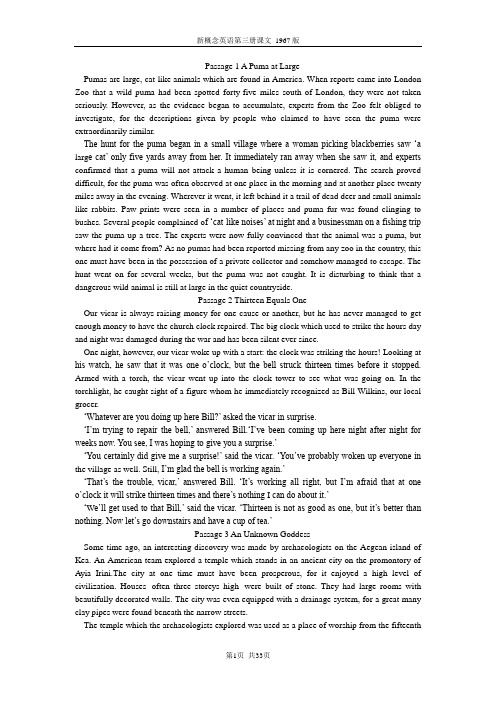
Passage 1 A Puma at LargePumas are large, cat-like animals which are found in America. When reports came into London Zoo that a wild puma had been spotted forty-five miles south of London, they were not taken seriously. However, as the evidence began to accumulate, experts from the Zoo felt obliged to investigate, for the descriptions given by people who claimed to have seen the puma were extraordinarily similar.The hunt for the puma began in a small village where a woman picking blackberries saw ‘a larg e cat’ only five yards away from her. It immediately ran away when she saw it, and experts confirmed that a puma will not attack a human being unless it is cornered. The search proved difficult, for the puma was often observed at one place in the morning and at another place twenty miles away in the evening. Wherever it went, it left behind it a trail of dead deer and small animals like rabbits. Paw prints were seen in a number of places and puma fur was found clinging to bushes. Several people complained o f ‘cat-like noises’ at night and a businessman on a fishing trip saw the puma up a tree. The experts were now fully convinced that the animal was a puma, but where had it come from? As no pumas had been reported missing from any zoo in the country, this one must have been in the possession of a private collector and somehow managed to escape. The hunt went on for several weeks, but the puma was not caught. It is disturbing to think that a dangerous wild animal is still at large in the quiet countryside.Passage 2 Thirteen Equals OneOur vicar is always raising money for one cause or another, but he has never managed to get enough money to have the church clock repaired. The big clock which used to strike the hours day and night was damaged during the war and has been silent ever since.One night, however, our vicar woke up with a start: the clock was striking the hours! Looking at his watch, he saw that it was one o’clock, but the bell struck thirteen times before it stopped. Armed with a torch, the vicar went up into the clock tower to see what was going on. In the torchlight, he caught sight of a figure whom he immediately recognized as Bill Wilkins, our local grocer.‘Whatever are you doing up here Bill?’ asked the vicar in surprise.‘I’m trying to repair the bell,’ answered Bill.‘I’ve been coming up here night after night for weeks now. Y ou see, I was hoping to give you a surprise.’‘Y ou certainly did give me a surprise!’said the vicar. ‘Y ou’ve probably woken up everyone in the village as well. Still, I’m glad the bell is working again.’‘That’s the trouble, vicar,’ answered Bill. ‘It’s working all right, but I’m afraid that at one o’clock it will strike thirteen times and there’s nothing I can do about it.’‘W e’ll get used to that Bill,’ said the vicar. ‘Thirteen is not as good as one, but it’s better than nothing. Now let’s go downstairs and have a cup of tea.’Passage 3 An Unknown GoddessSome time ago, an interesting discovery was made by archaeologists on the Aegean island of Kea. An American team explored a temple which stands in an ancient city on the promontory of A yia Irini.The city at one time must have been prosperous, for it enjoyed a high level of civilization. Houses--often three storeys high--were built of stone. They had large rooms with beautifully decorated walls. The city was even equipped with a drainage system, for a great many clay pipes were found beneath the narrow streets.The temple which the archaeologists explored was used as a place of worship from the fifteenthcentury B.C. until Roman times. In the most sacred room of the temple, clay fragments of fifteen statues were found. Each of these represented a goddess and had, at one time, been painted. The body of one statue was found among remains dating from the fifteenth century B.C. Its missing head happened to be among remains of the fifth century B.C. This head must have been found in Classical times and carefully preserved. It was very old and precious even then. When the archaeologists reconstructed the fragments, they were amazed to find that the goddess turned out to be a very modern-looking woman. She stood three feet high and her hands rested on her hips. She was wearing a full-length skirt which swept the ground. Despite her great age, she was very graceful indeed, but, so far, the archaeologists have been unable to discover her identity.Passage 4 The Double Life of Alfred BloggsThese days, people who do manual work often receive far more money than clerks who work in offices. People who work in offices are frequently referred to as ‘ white collar workers’ for the simple reason that they usually wear a collar and tie to go to work. Such is human nature, that a great many people are often willing to sacrifice higher pay for the privilege of becoming white collar workers. This can give rise to curious situations, as it did in the case of Alfred Bloggs who worked as a dustman for the Ellesmere Corporation.When he got married, Alf was too embarrassed to say anything to his wife about his job. He simply told her that he worked for the Corporation. Every morning, he left home dressed in a fine black suit. He then changed into overalls and spent the next eight hours as a dustman. Before returning home at night, he took a shower and changed back into his suit. Alf did this for over two years and his fellow dustmen kept his secret. Alf’s wife has never discovered that she married a dustman and she never will, for Alf has just found another job. He will soon be working in an office as a junior clerk. He will be earning only half as much as he used to, but he feels that his rise in status is well worth the loss of money. From now on, he will wear a suit all day and others will call him ‘Mr Bloggs’, not ‘Alf’.Passage 5 The FactsEditors of newspapers and magazines often go to extremes to provide their readers with unimportant facts and statistics. Last year a journalist had been instructed by a well-known magazine to write an article on the president’s palace in a new African republic. When the article arrived, the editor read the first sentence and then refused to publish it. The article began: ‘Hundreds of steps lead to the high wall which surrounds the president’s palace.’ The editor at once sent the journalist a telegram instructing him to find out the exact number of steps and the height of the wall.The journalist immediately set out to obtain these important facts, but he took a long time to send them. Meanwhile, the editor was getting impatient, for the magazine would soon go to press. He sent the journalist two urgent telegrams, but received no reply. He sent yet another telegram informing the journalist that if he did not reply soon he would be fired. When the journalist again failed to reply, the editor reluctantly published the article as it had originally been written. A week later, the editor at last received a telegram from the journalist. Not only had the poor man been arrested, but he had been sent to prison as well. However, he had at last been allowed to send a cable in which he informed the editor that he had been arrested while counting the 1084 steps leading to the 15 foot wall which surrounded the president’s palace.Passage 6 Smash and GrabThe expensive shops in a famous arcade near Piccadilly were just opening. At this time of themorning, the arcade was almost empty. Mr Taylor, the owner of a jewellery shop was admiring a new window display. Two of his assistants had been working busily since 8 o’clock and had only just finished. Diamond necklaces and rings had been beautifully arranged on a background of black velvet. After gazing at the display for several minutes, Mr Taylor went back into his shop. The silence was suddenly broken when a large car, with its headlights on and its horn blaring, roared down the arcade. It came to a stop outside the jewell er’s. One man stayed at the wheel while two others with black stockings over their faces jumped out and smashed the window of the shop with iron bars. While this was going on, Mr Taylor was upstairs. He and his staff began throwing furniture out of the window. Chairs and tables went flying into the arcade. One of the thieves was struck by a heavy statue, but he was too busy helping himself to diamonds to notice any pain. The raid was all over in three minutes, for the men scrambled back into the c ar and it moved off at a fantastic speed. Just as it was leaving, Mr Taylor rushed out and ran after it throwing ashtrays and vases, but it was impossible to stop the thieves. They had got away with thousands of pounds worth of diamonds.Passage 7 CrazyChildren often have far more sense than their elders. This simple truth was demonstrated rather dramatically during a civil defence exercise in a small town in Canada. Most of the inhabitants were asked to take part in the exercise during which they had to pretend that their city had been bombed. Air-raid warnings were sounded and thousands of people went into special air-raid shelters. Doctors and nurses remained above ground while police patrolled the streets in case anyone tried to leave the shelters too soon.The police did not have much to do because the citizens took the exercise seriously. They stayed underground for twenty minutes and waited for the siren to sound again. On leaving the air-raid shelters, they saw that doctors and nurses were busy. A great many people had volunteered to act as casualties. Theatrical make-up and artificial blood had been used to make the injuries look realistic. A lot of People were lying ‘dead’ in the streets. The living helped to carry the dead and wounded to special stations. A child of six was brought in by two adults. The child was supposed to be dead. With theatrical make-up on his face, he looked as if he had died of shock. Some people were so moved by the sight that they began to cry. However, the child suddenly sat up and a doctor asked him to comment on his death. The child looked around for a moment and said, ‘I think they’re all crazy!’Passage 8 A Famous MonasteryThe Great St Bernard Pass connects Switzerland to Italy. At 8114 feet, it is the highest mountain pass in Europe. The famous monastery of St Bernard, which was founded in the eleventh century, lies about a mile away. For hundreds of years, St Bernard dogs have saved the lives of travellers crossing the dangerous Pass. These friendly dogs, which were first brought from Asia, were used as watch-dogs even in Roman times. Now that a tunnel has been built through the mountains, the Pass is less dangerous, but each year, the dogs are still sent out into the snow whenever a traveller is in difficulty. Despite the new tunnel, there are still a few people who rashly attempt to cross the Pass on foot.During the summer months, the monastery is very busy, for it is visited by thousands of people who cross the Pass in cars. As there are so many people about, the dogs have to be kept in a special enclosure. In winter, however, life at the monastery is quite different. The temperature drops to -30°and very few people attempt to cross the Pass. The monks prefer winter to summerfor they have more privacy. The dogs have greater freedom, too, for they are allowed to wander outside their enclosure. The only regular visitors to the monastery in winter are parties of skiers who go there at Christmas and Easter. These young people, who love the peace of the mountains, always receive a warm w elcome at St Bernard’s monastery.Passage 9 A Trip to MarsBy now, a rocket will have set off on its 315 million mile trip to Mars and scientists must be waiting anxiously for the results. The rocket will be travelling for nine months before it reaches the planet. It contains a number of scientific instruments, including a television camera. Any pictures that are taken will have to travel for three weeks before they reach the earth. If the pictures are successful, they may solve a number of problems about Mars and provide information about the markings on its surface which, nearly 100 years ago, the astronomer, Schiaparelli, thought to be canals.It will be a long time before any landing on Mars can be attempted. This will only be possible when scientists have learnt a lot more about the atmosphere that surrounds the planet. If a satellite can one day be put into orbit round Mars, scientists will be able to find out a great deal. An interesting suggestion for measuring the atmosphere around Mars has been put forward. A rubber ball containing a radio transmitter could be dropped from a satellite so that it would fall towards the surface of the planet. The radio would signal the rate which the ball was slowed down and scientists would be able to calculate how dense the atmosphere is. It may even be possible to drop a capsule containing scientific instruments on to the planet’s surface. Only when a great deal more information has been obtained, will it be possible to plan a manned trip to Mars.Passage 10 The Loss of the ‘Titanic’The great ship, Titanic, sailed for New Y ork from Southampton on April 10th, 1912. She was carrying 1316 passengers and a crew of 891. Even by modern standards, the 66,000 ton Titanic was a colossal ship. At that time, however, she was not only the largest ship that had ever been built, but was regarded as unsinkable, for she had sixteen watertight compartments. Even if two of these were flooded, she would still be able to float. The tragic sinking of this great liner will always be remembered, for she went down on her first voyage with heavy loss of life.Four days after setting out, while the Titanic was sailing across the icy waters of the North Atlantic, a huge iceberg was suddenly spotted by a look-out. After the alarm had been given, the great ship turned sharply to avoid a direct collision. The Titanic turned just in time, narrowly missing the immense wall of ice which rose over 100 feet out of the water beside her. Suddenly, there was a slight trembling sound from below, and the captain went down to see what had happened. The noise had been so faint that no one thought that the ship had been damaged. Below, the captain realized to his horror that the Titanic was sinking rapidly, for five of her sixteen watertight compartments had already been flooded! The order to abandon ship was given and hundreds of people plunged into the icy water. As there were not enough life-boats for everybody, 1500 lives were lost.Passage 11 Not GuiltyGoing through the Customs is a tiresome business. The strangest thing about it is that really honest people are often made to feel guilty. The hardened professional smuggler, on the other hand, is never troubled by such feelings, even if he has five hundred gold watches hidden in his suitcase. When I returned from abroad recently, a particularly officious young Customs Officer clearly regarded me as a smuggler.‘Have you anything to declare?’ he asked, looking me in the eye.‘No,’ I answered confidently.‘Would you mind unlocking this suitcase please?’ ‘Not at all,’ I answered.The Officer went through the case with great care. All the things I had packed so carefully were soon in a dreadful mess. I felt sure I would never be able to close the case again. Suddenly, I saw the Officer’s face light up. He had spotted a tiny bottle at the bottom of my case and he pounced on it with delight.‘Perfume, eh?’ he asked sarcastically. ‘Y ou should have declared that. Perfume is not exempt from import duty.’‘But it isn’t perfume,’ I said. ‘It’s hair-oil.’ Then I added with a smile, ‘It’s a strange mixture I make myself.’As I expected, he did not believe me.‘Try it!’ I said encouragingly. The Officer unscrewed the cap and put the bottle to his nostrils. He was greeted by an unpleasant smell which convinced him that I was telling the truth. A few minutes later, I was able to hurry away with precious chalk-marks on my baggage.Passage 12 Life on a Desert IslandMost of us have formed an unrealistic picture of life on a desert island. We sometimes imagine a desert island to be a sort of paradise where the sun always shines. Life there is simple and good. Ripe fruit falls from the trees and you never have to work. The other side of the picture is quite the opposite. Life on a desert island is wretched. Y ou either starve to death or live like Robinson Crusoe, waiting for a boat which never comes. Perhaps there is an element of truth in both these pictures, but few of us have had the opportunity to find out.Two men who recently spent five days on a coral island wished they had stayed there longer. They were taking a badly damaged boat from the V irgin Islands to Miami to have it repaired. During the journey, their boat began to sink. They quickly loaded a small rubber dinghy with food, matches, and tins of beer and rowed for a few miles across the Caribbean until they arrived at a tiny coral island. There were hardly any trees on the island and there was no water, but this did not prove to be a problem. The men collected rain-water in the rubber dinghy. As they had brought a spear gun with them, they had plenty to eat. They caught lobster and fish every day, and, as one of them put it ‘ate like kings’. When a passing tanker rescued them five days later, both men were genuinely sorry that they had to leave.Passage 13 ‘It’s Only Me’After her husband had gone to work, Mrs Richards sent her children to school and went upstairs to her bedroom. She was too excited to do any housework that morning, for in the evening she would be going to a fancy dress party with her husband. She intended to dress up as a ghost and as she had made her costume the night before, she was impatient to try it on. Though the costume consisted only of a sheet, it was very effective. After putting it on, Mrs Richards went downstairs. She wanted to find out whether it would be comfortable to wear.Just as Mrs Richards was entering the dining-room, there was a knock on the front door. She knew that it must be the baker. She had told him to come straight in if ever she failed to open the door and to leave the bread on the kitchen table. Not wanting to frighten the poor man, Mrs Richards quickly hid in the small store-room under the stairs. She heard the front door open and heavy footsteps in the hall. Suddenly the door of the store-room was opened and a man entered. Mrs Richards realized that it must be the man from the Electricity Board who had come to read themeter. She tried to explain the situation, saying ‘It’s only me’, but it was too late. The man let out a cry and jumped back several paces. When Mrs Richards walked towards him, he fled, slamming the door behind him.Passage 14 A Noble GangsterThere was a time when the owners of shop and businesses in Chicago had to pay large sums of money to gangsters in return for’ protection’. If the money was not paid promptly, the gangsters would quickly put a man out of business by destroying his shop. Obtaining ‘protec ti on money’ is not a modern crime. As long ago as the fourteenth century, an Englishman, Sir John Hawkwood, made the remarkable discovery that people would rather pay large sums of money than have their life work destroyed by gangsters.Six hundred years ago, Sir John Hawkwood arrived in Italy with a band of soldiers and settled near Florence. He soon made a name for himself and came to be known to the Italians as Giovanni Acuto. Whenever the Italian city-states were at war with each other, Hawkwood used to hire his soldiers to princes who were willing to pay the high price he demanded. In times of peac e, when business was bad, Hawkwood and his men would march into a city-state and, after burning down a few farms, would offer to go away if protection money was paid to them. Hawkwood made large sums of money in this way. In spite of this, the Italians regarded him as a sort of hero. When he died at the age of eighty, the Florentines gave him a state funeral and had a picture painted which was dedicated to the memory of ‘the most valiant soldier and most notable leader, Signor Giovanni Haukodue’.Passage 15 Sixpence Worth of TroubleChildren always appreciate small gifts of money. Father, of course, provides a regular supply of pocket-money, but uncles and aunts are always a source of extra income. With some children, small sums go a long way. If sixpences are not exchanged for sweets, they rattle for months inside money-boxes. Only very thrifty children manage to fill up a money-box. For most of them, sixpence is a small price to pay for a satisfying bar of chocolate.My nephew, George, has a money-box but it is always empty. V ery few of the sixpences I have given him have found their way there. I gave him sixpence yesterday and advised him to save it. Instead, he bought himself sixpence worth of trouble. On his way to the sweet shop, he dropped his sixpence and it rolled along the pavement and then disappeared down a drain. George took off his jacket, rolled up his sleeves and pushed his right arm through the drain cover. He could not find his sixpence anywhere, and what is more, he could not get his arm out. A crowd of people gathered round him and a lady rubbed his arm with soap and butter, but George was firmly stuck. The fire-brigade was called and two firemen freed George using a special type of grease. George was not too upset by his experience because the lady who owns the sweet shop heard about his troubles and rewarded him with a large box of chocolates.Passage 16 Mary had a Little LambMary and her husband Dimitri lived in the tiny village of Perachora in southern Greece. One of Mary’s priz e possessions was a little white lamb which her husband had given her. She kept it tied to a tree in a field during the day and went to fetch it every evening. One evening, however, the lamb was missing. The rope had been cut, so it was obvious that the lamb had been stolen. When Dimitri came in from the fields, His wife told him what had happened.Dimitri at once setout to find the thief. He knew it would not prove difficult in such a small village. After telling several of his friends about the theft, Dimitri found out that his neighbour, Aleko, had suddenly acquired a new lamb. Dimitri immediately went to Aleko’s house and angrily accused him of stealing the lamb. He told him he had better return it or he would call the police. Aleko denied taking it and led Dimitri into his back-yard. It was true that he had just bought a lamb, he explained, but his lamb was black. Ashamed of having acted so rashly, Dimitri apologized to Aleko for having accused him. While they were talking it began to rain and Dimitri stayed in Aleko’s house until the rain stopped. When he went outside half an hour later, he was astonished to find that the little black lamb was almost white. Its wool, which had been dyed black, had been washed clean by the rain!Passage 17 The Greatest Bridge in the WorldV errazano, an Italian about whom little is known, sailed into New Y ork Harbour in 1524 and named it Angouleme. He described it as ‘a very agreeable situation located within two small hills in the midst of which flowed a great river.’ Though V errazano is by no means considered to be a great explorer, his name will probably remain immortal, for on November 21st, 1964, the greatest bridge in the world was named after him.The V errazano Bridge, which was designed by Othmar Ammann, joins Brooklyn to Staten Island. It has a span of 4260 feet. The bridge is so long that the shape of the earth had to be taken into account by its designer. Two great towers support four huge cables. The towers are built on immense underwater platforms made of steel and concrete. The platforms extend to a depth of over 100 feet under the sea. These alone took sixteen months to build. Above the surface of the water, the towers rise to a height of nearly 700 feet. They support the cables from which the bridge has been suspended. Each of the four cables contains 26,108 lengths of wire. It has been estimated that if the bridge were packed with cars, it would still only be carrying a third of its total capacity. However, size and strength are not the only important things about this bridge. Despite its immensity, it is both simple and elegant, fulfilling its designer’s dream to create ‘an enormous object drawn as faintly as possible’.Passage 18 Electric Currents in Modern ArtModern sculpture rarely surprises us any more. The idea that modern art can only be seen in museums is mistaken. Even people who take no interest in art cannot have failed to notice examples of modern sculpture on display in public places. Strange forms stand in gardens, and outside buildings and shops. We have got quite used to them. Some so-called ‘modern’ pieces have been on display for nearly fifty years.In spite of this, some people--including myself--were surprised by a recent exhibition of modern sculpture. The first thing I saw when I entered the art gallery was a notice which said: ‘Do not touch the exhibits. Some of them are dangerous!’ The objects on display were pieces of moving sculpture. Oddly shaped forms that are suspended from the ceiling and move in response to a gust of wind are quite familiar to everybody. These objects, however, were different. Lined up against the wall, there were long thin wires attached to metal spheres. The spheres had been magnetized and attracted or repelled each other all the time. In the centre of the hall, there were a number of tall structures which contained coloured lights. These lights flickered continuously like traffic lights which have gone mad. Sparks were emitted from small black boxes and red lamps flashed on and off angrily. It was rather like an exhibition of prehistoric electronic equipment. These peculiar forms not only seemed designed to shock people emotionally, but to give them electricshocks as well!Passage 19 A V ery Dear CatKidnappers are rarely interested in Animals, but they recently took considerable interest in Mrs Eleanor Ramsay’s cat. Mrs Eleanor Ramsay, a very wealthy old lady, has shared a flat with her cat, Rastus, for a great many years. Rastus leads an orderly life. He usually takes a short walk in the evenings and i s always home by seven o’clock. One evening, however, he failed to arrive. Mrs Ramsay got very worried. She looked everywhere for him but could not find him.Three days after Rastus’ disappearance, Mrs Ramsay received an anonymous letter. The writer stated that Rastus was in safe hands and would be returned immediately if Mrs Ramsay paid a ransom of £1000. Mrs Ramsay was instructed to place the money in a cardboard box and to leave it outside her door. At first, she decided to go to the police, but fearing that she would never see Rastus again --the letter had made that quite clear--she changed her mind. She drew £1000 from her bank and followed the kidnapper’s instructions. The next morning, the box had disappeared but Mrs Ramsay was sure that the kidnapper would keep his word. Sure enough, Rastus arrived punctually at seven o’clock that evening. He looked very well, though he was rather thirsty, for he drank half a bottle of milk. The police were astounded when Mrs Ramsay told them what she had done. She explained that Rastus was very dear to her. Considering the amount she paid, he was dear in more ways than one!Passage 20 Pioneer PilotsIn 1908 Lord Northcliffe offered a prize of £1000 to the first man who would fly across the English Channel. Over a year passed before the first attempt was made. On July 19th, 1909, in the early morning, Hubert Latham took off from the French coast in his plane the ‘Antoinette IV’. He had travelled only seven miles across the Channel when his engine failed and he was forced to land on the sea. The ‘Antoinette’ floated on the water until Latham was picked up by a ship.Two days later, Louis Bleriot arrived near Calais with a plane called ‘No. XI’. Bleriot had been making planes since 1905 and this was his latest model. A week before, he had completed a successful overland flight during which he covered twenty-six miles. Latham, however, did not give up easily. He, too, arrived near Calais on the same day with a new ‘Antoinette’. It looks as if there would be an exciting race across the Channel. Both planes were going to take off on July 25th, but Latham failed to get up early enough. After making a short test flight at 4.15 a.m., Bleriot set off half an hour later. His great flight lasted thirty seven minutes. When he landed near Dover, the first person to greet him was a local policeman. Latham made another attempt a week later and got within half a mile of Dover, but he was unlucky again. His engine failed and he landed on the sea for the second time.Passage 21 Daniel MendozaBoxing matches were very popular in England two hundred years ago. In those days, boxers fought with bare fists for p rize money. Because of this, they were known as ‘prize-fighters’. However, boxing was very crude, for there were no rules and a prize-fighter could be seriously injured or even killed during a match.One of the most colourful figures in boxing history was Daniel Mendoza who was born in 1764. The use of gloves was not introduced until 1860 when the Marquis of Queensberry drew up the first set of rules. Though he was technically a prize-fighter, Mendoza did much to change crude prize-fighting into a sport, for he brought science to the game. In his day, Mendoza enjoyed tremendous popularity. He was adored by rich and poor alike.。
- 1、下载文档前请自行甄别文档内容的完整性,平台不提供额外的编辑、内容补充、找答案等附加服务。
- 2、"仅部分预览"的文档,不可在线预览部分如存在完整性等问题,可反馈申请退款(可完整预览的文档不适用该条件!)。
- 3、如文档侵犯您的权益,请联系客服反馈,我们会尽快为您处理(人工客服工作时间:9:00-18:30)。
Passage 7 CrazyChildren often have far more sense than their elders. This simple truth was demonstrated rather dramatically during a civil defence exercise in a small town in Canada. Most of the inhabitants were asked to take part in the exercise during which they had to pretend that their city had been bombed. Air-raid warnings were sounded and thousands of people went into special air-raid shelters. Doctors and nurses remained above ground while police patrolled the streets in case anyone tried to leave the shelters too soon.The police did not have much to do because the citizens took the exercise seriously. They stayed underground for twenty minutes and waited for the siren to sound again. On leaving the air-raid shelters, they saw that doctors and nurses were busy. A great many people had volunteered to act as casualties. Theatrical make-up and artificial blood had been used to make the injuries look realistic. A lot of People were lying ‘dead’ in the streets. The living helped to carry the dead and wounded to special stations. A child of six was brought in by two adults. The child was supposed to be dead. With theatrical make-up on his face, he looked as if he had died of shock. Some people were so moved by the sight that they began to cry. However, the child suddenly sat up and a doctor asked him to comment on his death. The child looked around for a moment and said, ‘I think they’re all crazy!’Passage9 A Trip to MarsBy now, a rocket will have set off on its 315million mile trip to Mars and scientists must be waiting anxiously for the results. The rocket will be travelling for nine months before it reaches the planet. It contains a number of scientific instruments, including a television camera. Any pictures that are taken will have to travel for three weeks before they reach the earth. If the pictures are successful, they may solve a number of problems about Mars and provide information about the markings on its surface which, nearly 100 years ago, the astronomer, Schiaparelli, thought to be canals.It will be a long time before any landing on Mars can be attempted. This will only be possible when scientists have learnt a lot more about the atmosphere that surrounds the planet. If a satellite can one day be put into orbit round Mars, scientists will be able to find out a great deal. An interesting suggestion for measuring the atmosphere around Mars has been put forward. A rubber ball containing a radio transmitter could be dropped from a satellite so that it would fall towards the surface of the planet. The radio would signal the rate which the ball was slowed down and scientists would be able to calculate how dense the atmosphere is. It may even be possible to drop a capsule containing scientific instruments onto the planet’s surface. Only when a great deal more information has been obtained, will it be possible to plan a manned trip to Mars.Passage 47 Through the Earth’s CrustSatellites orbiting round the earth have provided scientists with a vast amount of information about conditions in outer space. By comparison, relatively little is known about the internal structure of the earth. It has proved easier to go up than to go down. The deepest hole ever to be bored on land went down 25,340 feet—considerably less than the height of Mount Everest. Drilling a hole under the sea has proved to be even more difficult. The deepest hole bored under sea has been about 20,000 feet. Until recently, scientists have been unable to devise a drill which would be capable of cutting through hard rock at great depths.This problem has now been solved. Scientists have developed a method which sounds surprisingly simple. A new drill which is being tested at Leona Valley Ranch in Texas is driven by a turbine engine which is propelled by liquid mud pumped into it from the surface. As the diamond tip of the drill revolves, it is lubricated by mud. Scientists have been amazed to find that it can cut through the hardest rock with great ease. The drill has been designed to bore through the earth to a depth of 35,000 feet. It will enable scientists to obtain samples of the mysterious layer which lies immediately below the earth’s crust. This layer is known as the Mohorovicic Discontinuity, but is commonly referred to as ‘the Moho’.Before it is possible to drill this deep hole, scientists will have to overcome a number of problems. Geological tests will be carried out to find the point at which the earth’s crust is thinn est. The three possible sites which are being considered are all at sea: two in the Atlantic Ocean and one in the Pacific. Once they have determined on a site, they will have to erect a drilling vessel which will not be swept away by ocean currents. The vessel will consist of an immense platform which will rise to 70 feet above the water. It will be supported by six hollow columns which will descend to a depth of 60 feet below the ocean surface where they will be fixed to a huge float. A tall steel tower rising to a height of nearly 200 feet will rest on the platform. The drill will be stored in the tower and will have to be lowered through about 15,000 feet of water before operations can begin. Within the tower, there will be a laboratory, living accommodation and a helicopter landing station. Keeping the platform in position at sea will give rise to further problems. To do this, scientists will have to devise methods using radar and under water television. If, during the operations the drill has to be withdrawn, it must be possible to re-insert it. Great care will therefore have to be taken to keep the platform steady and make it strong enough to withstand hurricanes. If the project is successful, scientists will not only learn a great deal about the earth, but possibly about the nature of the universe itself.Passage 51 AutomationOne of the greatest advances in modern technology has been the invention of computers. They are already widely used in industry and in universities and the time may come when it will be possible for ordinary people to use them as well. Computers are capable of doing extremely complicated work in all branches of learning. They can solve the most complex mathematical problems or put thousands of unrelated facts in order. These machines can be put to varied uses. For instance, they can provide information on the best way to prevent traffic accidents, or they can count the number of times the word ‘and’ has been used in the Bible. Because they work accurately and at high speeds, they save research workers years of hard work. This whole process by which machines can be used to work for us has been called automation. In the future, automation may enable human beings to enjoy far more leisure than they do today. The coming of automation is bound to have important social consequences.Sometime ago an expert, on automation, Sir Leon Bagrit, pointed out that it was a mistake to believe that these machines could ‘think’. There is no possibility that human beings will be ‘controlled by machines’. Though computers are capable of learning from their mistakes and improving on their performance they need detailed instructions from human beings in order to be able to operate. They can never, as it were, lead in dependent lives, or ‘rule the world’ by making decisions of their own.Sir Leon said that in the future, computers would be developed which would be small enough to carry in the pocket. Ordinary people would then be able to use them to obtain valuable information. Computers could be plugged into a national network and be used like radios. For instance, people going on holiday could be informed about weather conditions; car drivers could be given alternative routes when there are traffic jams. It will also be possible to make tiny translating machines. This will enable people who do not share a common language to talk to each other without any difficulty or to read foreign publications. It is impossible to assess the importance of a machine of this sort, for many international misunderstandings are caused simply through our failure to understand each other. Computers will also be used in hospitals. By providing a machine with a patient’s symptoms, a doctor will be able to diagnose the nature of his illness. Similarly, machines could be used to keep a check on a patient’s health record and bring it up to date. Doctors will therefore have immediate access to a great many facts which will help them in their work. Book-keepers and accountants, too, could be relieved of dull clerical work, for the tedious task of compiling and checking lists of figures could be done entirely by machines. Computers are the most efficient servants man has ever had and there is no limit to the way they can be used to improve our lives.。
